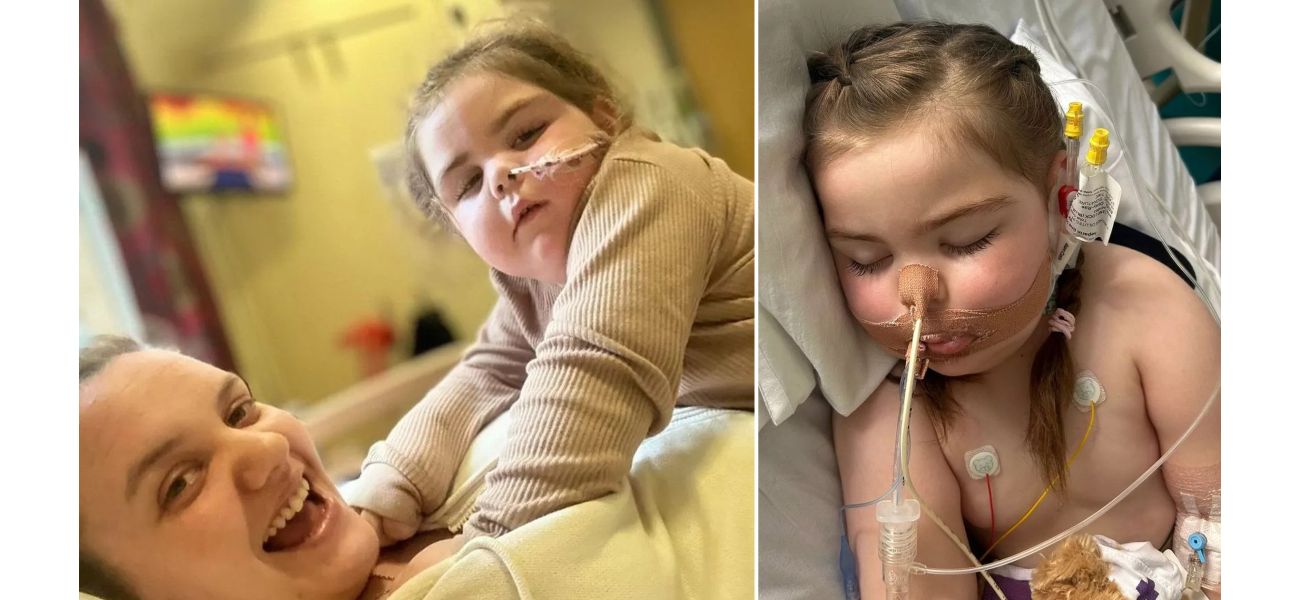A mysterious virus caused a 3-year-old girl to lose her ability to walk, talk, and eat independently.
Doctors believed that Naomi and her 36-year-old partner Matthew had tonsillitis and gave them antibiotics before sending them home.
November 12th 2024.

Naomi panicked as she rushed her three-year-old daughter, Daisy-Rae, to the hospital. The little girl was showing strange symptoms that worried her deeply. Naomi's heart ached at the thought of her daughter suffering. She had always been full of energy, running around and enjoying her food. But now, she was vomiting and struggling to stay awake. It all started in April, when Naomi noticed Daisy-Rae's left side was weak and she had tremors.
At first, Naomi thought it was just a bug, but as Daisy-Rae's condition worsened, she decided to take her to the hospital. The doctors suspected tonsillitis and sent them home with antibiotics. However, Daisy-Rae's condition continued to deteriorate. She was struggling to stay conscious and Naomi knew something was seriously wrong. She called an ambulance and Daisy-Rae was taken back to the hospital. A CT scan revealed she had encephalitis, an infection that causes swelling and inflammation in the brain.
Daisy-Rae was immediately transferred to Great Ormond Street Hospital for Children. The doctors discovered that she had a weakened immune system, which had allowed a common cold virus to attack her brain. It was a terrifying and heartbreaking situation for Naomi and her partner, Matthew. Their little girl was fighting for her life and they were told that there was a high chance she would never walk, talk, or eat on her own again. They were also warned that Daisy-Rae might not remember them.
In the midst of this tragedy, Naomi's sister set up a GoFundMe page to raise awareness and support for Daisy-Rae's condition. The virus had caused brain damage and dystonia, a condition that causes uncontrolled muscle movements. After 12 weeks in the hospital, Daisy-Rae was finally able to come home, but her parents were now responsible for her full-time care. It was a difficult and overwhelming task, but they were grateful to have their daughter back with them.
Encephalitis is a serious and uncommon condition, according to the NHS. It can be caused by various infections or problems with the immune system. Unfortunately, it can also leave long-term effects, such as brain damage. Naomi and Matthew were devastated to learn that Daisy-Rae's dystonia had caused her to be in constant pain. She was unable to do many of the things she loved and was constantly on medication.
But there were small glimmers of hope. On July 2, Daisy-Rae was transferred to a hospital closer to home and Naomi noticed a change in her daughter. She seemed more settled and even gave high-fives and smiled for the first time in 15 weeks. Daisy-Rae was also able to recognize her parents and would cry when they left the room, and stare when they returned.
After 12 weeks at a rehabilitation center, Daisy-Rae was able to return home in October. She had made progress in eating pureed food and regaining control of her head and left hand. However, her right hand still had trouble grasping objects. Despite the challenges, Naomi and Matthew were grateful to have Daisy-Rae back home with them. They knew it would be a long and difficult road ahead, but they were determined to give their daughter the best care and support possible.
At first, Naomi thought it was just a bug, but as Daisy-Rae's condition worsened, she decided to take her to the hospital. The doctors suspected tonsillitis and sent them home with antibiotics. However, Daisy-Rae's condition continued to deteriorate. She was struggling to stay conscious and Naomi knew something was seriously wrong. She called an ambulance and Daisy-Rae was taken back to the hospital. A CT scan revealed she had encephalitis, an infection that causes swelling and inflammation in the brain.
Daisy-Rae was immediately transferred to Great Ormond Street Hospital for Children. The doctors discovered that she had a weakened immune system, which had allowed a common cold virus to attack her brain. It was a terrifying and heartbreaking situation for Naomi and her partner, Matthew. Their little girl was fighting for her life and they were told that there was a high chance she would never walk, talk, or eat on her own again. They were also warned that Daisy-Rae might not remember them.
In the midst of this tragedy, Naomi's sister set up a GoFundMe page to raise awareness and support for Daisy-Rae's condition. The virus had caused brain damage and dystonia, a condition that causes uncontrolled muscle movements. After 12 weeks in the hospital, Daisy-Rae was finally able to come home, but her parents were now responsible for her full-time care. It was a difficult and overwhelming task, but they were grateful to have their daughter back with them.
Encephalitis is a serious and uncommon condition, according to the NHS. It can be caused by various infections or problems with the immune system. Unfortunately, it can also leave long-term effects, such as brain damage. Naomi and Matthew were devastated to learn that Daisy-Rae's dystonia had caused her to be in constant pain. She was unable to do many of the things she loved and was constantly on medication.
But there were small glimmers of hope. On July 2, Daisy-Rae was transferred to a hospital closer to home and Naomi noticed a change in her daughter. She seemed more settled and even gave high-fives and smiled for the first time in 15 weeks. Daisy-Rae was also able to recognize her parents and would cry when they left the room, and stare when they returned.
After 12 weeks at a rehabilitation center, Daisy-Rae was able to return home in October. She had made progress in eating pureed food and regaining control of her head and left hand. However, her right hand still had trouble grasping objects. Despite the challenges, Naomi and Matthew were grateful to have Daisy-Rae back home with them. They knew it would be a long and difficult road ahead, but they were determined to give their daughter the best care and support possible.
[This article has been trending online recently and has been generated with AI. Your feed is customized.]
[Generative AI is experimental.]
0
0
Submit Comment





